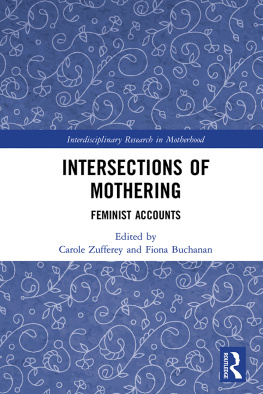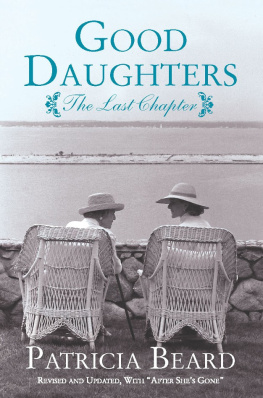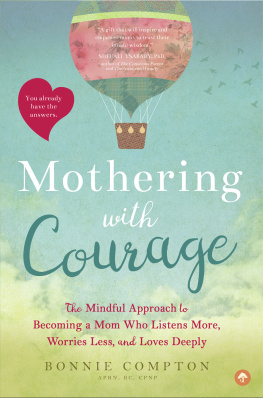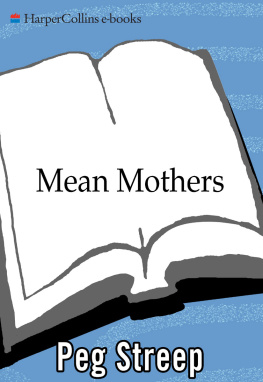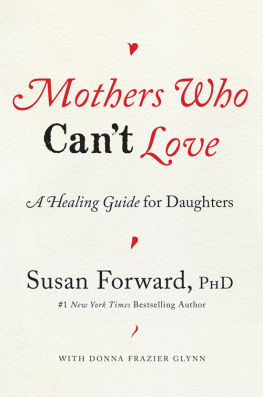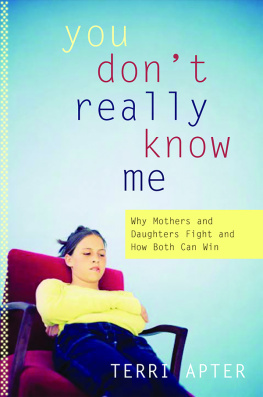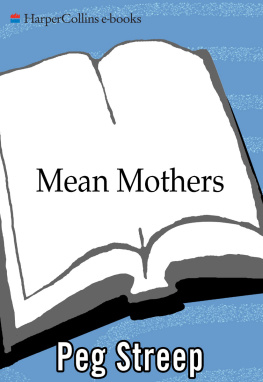

Copyright 2017 by Sandra Butler and Nan Fink Gefen
All rights reserved. No part of this publication may be reproduced, distributed, or transmitted in any form or by any means, including photocopying, recording, digital scanning, or other electronic or mechanical methods, without the prior written permission of the publisher, except in the case of brief quotations embodied in critical reviews and certain other noncommercial uses permitted by copyright law. For permission requests, please address She Writes Press.
Published 2017
Printed in the United States of America
Print ISBN: 978-1-63152-278-9
E-ISBN: 978-1-63152-279-6
Library of Congress Control Number: 2017942937
For information, address:
She Writes Press
1563 Solano Ave #546
Berkeley, CA 94707
Cover design Julie Metz, Ltd./metzdesign.com
Book design by Stacey Aaronson/thebookdoctorisin.com
She Writes Press is a division of SparkPoint Studio, LLC.
Names and identifying characteristics have been changed to protect the privacy of certain individuals.
To our daughters
Possibly there is nothing in human nature more resonant with charges than the flow of energy between two biologically alike bodies, one of which has lain in amniotic bliss inside the other....
The materials are here for the deepest mutuality and the most painful estrangement.
ADRIENNE RICH
Of Woman Born: Motherhood as Experience and Institution
CONTENTS

CHAPTER ONE
A Question of Closeness
CHAPTER TWO
Generation to Generation
CHAPTER THREE
Under the Surface
CHAPTER FOUR
Mothering In The Present Tense
CHAPTER FIVE
Navigating the Difficulties
CHAPTER SIX
The Voice Suppressed
CHAPTER SEVEN
The Years Ahead
CHAPTER EIGHT
A Time of Reckoning
INTRODUCTION

M otherhood at any age is a daunting proposition.
As mothers in our seventies, we know how intimidating it is to look back on all that has taken place with our daughters. Were familiar with the deep mutuality and painful estrangement that has been part of our mothering experience. We review the pleasures, satisfactions, sorrows, and disappointments in these relationships and consider what we might have said or done differently to change the course of events. The mistakes weve made are more apparent to us, the love we have for our daughters feels sharp and strong, and we seek to heal the tensions and misunderstandings that still exist. We are more thoughtful these days, less reactive, and perhaps a bit braver.
Our daughters are among the most important people in our lives, yet they, like us, are changing. Theyre now middle-aged women with crowded schedules, demanding responsibilities, and multiple commitments. While our lives are contracting and moving toward completion, theirs are expanding, and they are focused on future possibility. The balance between us is shifting; they no longer need us as they once did, and we sometimes find ourselves wanting more from them. More contact. More time. More intimacy.
These grown women are still our children, but we sometimes are uncertain about what mothering feels like, looks like, and means at this stage in our lives. When our daughters were small, our task was to protect, nourish, and guide them, but that is no longer our responsibility. Were aware that we sometimes miss important cues and fail to be sensitive to what they need, or, in our eagerness to be of use, respond with too much advice or frustrate them with unwanted efforts.
Our questions about mothering at this time led us to write this book. We wanted to know more about the challenges and satisfactions of other mothers, the issues that have arisen for them, and the insights they have, thinking that this would help us become clearer about our own experiences of mothering. We also wanted to open a conversation about this extremely important topic because so much misunderstanding exists. Most people assume that mothering is no longer an active role once offspring are solidly in their middle years, yet we are intimately engaged with our daughters in ways that feel like mothering to us. When we asked other aging women if they shared our sense of this ongoing, active role, the vast majority said they did.
Intrigued by the discrepancy between perception and reality, we began to immerse ourselves in what has been written about mothering middle-aged daughters. The words of poets and novelists gave us a glimpse of the language and emotional honesty we wanted, and this encouraged us, but when we turned to nonfiction and psychological research, our search failed to yield results. Most of what has been published about mothering is geared toward younger women with young daughters and contains guidance and advice for solving issues in their relationships. But we were interested in descriptions of experience, not prescriptions for improvement or problem solving. We didnt find anything of interest directed to mothers over sixty-five that offered us this perspective.
Once we became aware of the lack of resources available, we turned to the mothers themselves to learn what we could. We decided to focus on their descriptions of these relationships, knowing that if we interviewed their daughters or others in their families, the book would be at odds with our intention to hear about mothering from their point of view. We understand that no relationship exists in a vacuum, and that both mothers and daughters are connected to sons, husbands, partners, and significant others who affect what happens between them. We also understand that many of the issues that arise between mothers and daughters are exacerbated by a pervasive, amorphous societal misogyny and unreasonable expectations of the experience of mothering. We trusted that these dynamics would be revealed through the words of the women we interviewed.
To begin, we crafted an open-ended questionnaire and reached out through ads, email notices, and word of mouth to women whose ages ranged from sixty-five to eight-five. We were looking for those who are generally active, healthy, and independent enough not to need much financial or emotional care from their daughters at this time. We were committed to including a wide range of class backgrounds, racial identities, ethnicities, sexual orientations, and levels of education, and we chose a mix of working and retired women, as well as those who were single, divorced, lesbian, married, partnered, and living in blended families.
Ultimately, we met with seventy-eight women, most of whom lived in the San Francisco Bay Area. Our interviews usually took several hours, the physical environments ranged from spacious family homes to small studio apartments, and mothers were uniformly grateful and eager to talk about their daughters in ways they had not done before, except perhaps with a partner, close friend, or therapist. There were tears and hesitations as women searched for the right words to express the complexity of their feelings about mothering these offspring. We heard their pride and concern, their struggles in constructing what felt like appropriate boundaries, and their deep regrets and efforts at forgiveness for both the consequential and unwitting mistakes they had made through the years.
Next page

